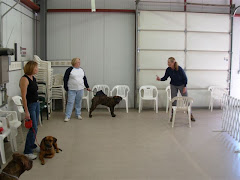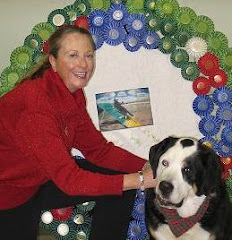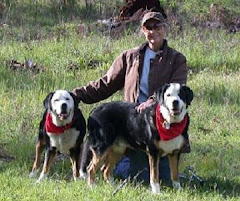
It's the most highly sought-after quality in companion dogs, even though you may not have heard of it.
It's "will to please." This is exactly what it sounds like, but it's a term used by behaviorists and some breeders to describe a dog's longing to be a submissive partner to a good leader. This trait is what makes your dog want to do the "right" thing to earn your affection and approval.
Some breeds are known for this trait. Others are known for lack of it. To a large extent, it's what makes good dogs for competitive obedience. They're relatively easy to train because they try harder than other dogs to please their handlers.
If you want a good companion dog--not one who will just herd sheep, point birds, or guard a parking lot at night--you need a dog with WTP. Breeds generally known for this characteristic include golden retrievers, Labradors, Shetland Sheep Dogs, Australian sheperds, border collies, and some of the "softer" terriers. Any dog of any breed can have strong WTP, since it has a lot to do with individual personality. But arguably, WTP has been developed more in the above-mentioned breeds than in others of a more independent nature.
Dogs developed to work independently--Great Pyrennees, hounds, vermin-chasing terriers, Chow Chows, Akitas, malamutes and huskies, to name a few--generally lack this quality. They are trainable and can be "persuaded" to be obedient. But their obedience often comes with a "Well, if I have to..." attitude, if it comes at all.
Take the following test to determine your dog's level of WTP. Scoring directions are at the bottom.
1. When I ask my dog to "sit," using a treat to lure him, he sits:
a) fast, with bright, pleading eyes
b) slowly, with a bored expression
c) not at all; he just ignore the command and stares at the treat.
2. When I'm watching TV with my dog lying across the room from me, she is
a) resting, but watching my every move
b) sleeping
c) resting, but totally ignoring me
3. When I practice obedience games or drills, my dog acts
a) alert, happy, and eager to learn something new
b) bored, but will begrudgingly go along with me
c) like I'm not even there, and I must force everything I ask
4. When I return home from a short absence, my dog
a) runs to me in a low, submissive position, with tail wagging
b) trots to me in an alert posture, tail up, and "checks in" to see if I have any treats on me
c) glances in my direction and might amble over to sniff me and see what other animals I've been petting
5. When my dog wants affection, he will
a) come quietly to me and sit and stare at me with his ears back and relaxed until I pet him
b) trot over to me and touch me with his paws or his body, until I pet him
c) neither of the above; my dog doesn't seek out affection
6. When I pet my dog, she
a) relaxes, licks her nose, flattens her ears, and stares at me as if I'm her hero
b) likes it for a few seconds and then is ready to leave me and do something else
c) doesn't respond at all; her mind is on other things.
7. When I call my dog to come into the house, he
a) Drops what he's doing and comes running, glad to see me
b) Acknowledges me and slowly starts ambling in my direction
c) Ignores me and keeps on doing what he's doing
8. In the first week of a group obedience class, my dog would probably
a) Stay very close to me and make steady eye contact with me
b) Be sociable with the other dogs while keeping up interaction with me
c) Totally ignore me and be interested only in what the other dogs were doing
9. When I reprimand my dog, she
a) Looks "sad" and submissive, as if she's truly sorry
b) Rolls over on her back, but then bounces up again, unscathed, as soon as the moment has passed
c) Gives me a defiant stare or even growls at me
10. Given the choice of playing with me or with a bunch of other dogs, my dog would
a) Choose me every time
b) Be torn between the two and want me to play with the dogs too
c) Choose the dogs any day, even if I called her away from them
Scoring: give your dog 3 points for every (a) answer, 2 points for every (b) answer, and 1 point for every (c) answer.
25-30 points: You have a dog who worships you and is putty in your hands. Get out and try obedience or rally competition. Teach your dog how to dance with you. Your dog is a sponge ready to soak up any education you throw her way. You are blessed with the companion dog of most folks' dreams.
20-25 points: Your dog is a fun companion with a mind of his own. He requires some space. He's a thinker, and he makes choices. Teach him to make the right choices and he'll be a supportive partner for you. He's not emotionally fragile, so he may need firm direction. Don't be afraid to show him leadership. He'll have his good days and his not-so-good days, but all in all you'll enjoy his company and learn something from him.
15-20 points: Your dog is going to keep you on your toes. She's probably very intelligent, even cunning, so don't misread her lack of obedience for lack of smarts. She has them. To outwit her, you need to think more like she does. You won't win her over with sweetness and affection, but rather with intelligence. She'll be the type who appreciates an intelligent individual and may be willing to defer to your judgment on occasion.
10-15 points: You have a roommate, not a companion dog. Find a job for which your dog was bred to do, and get this dog to work! Your dog appreciates having a task or a project more than having a person. Respect your dog for his independence and his strong will. Accept the fact that your dog is probably never going to win an obedience title or impress your friends with his charm. Those are, after all, your goals for your dog, and not his goals. We're all different, and we all have things we can learn from each other. Listen to what your dog has to tell you about what's important in his life, and why.


















No comments:
Post a Comment